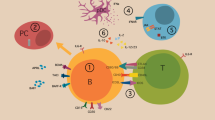Abstract
Speaking for the inThought Expert Discussion Series in February, Dr George Tsokos mirrored the opinion of many lupus thought leaders: Human Genome Sciences (HGS) and GlaxoSmithKline’s (GSK) belimumab (Benlysta®) was likely to be approved by the US FDA and, despite modest efficacy, will be used by a large proportion of lupus patients.
Dr Tsokos praised HGS and GSK’s clinical trial program for belimumab, noting that huge trials and unique trial endpoints were needed to demonstrate the drug’s efficacy, allowing it to succeed where so many other lupus drugs have failed.
Still, belimumab’s trial design may not become standard in future lupus trials — questions about identification of appropriate lupus patients with active disease, trial endpoints, and subgrouping lupus patients remain.
Although Dr Tsokos does not expect other agents currently being tested in lupus trials to be significantly more efficacious than belimumab, his research suggests that significantly better results could be obtained using agents targeting interleukin-17, spleen tyrosine kinase (SYK), and calcium/calmodulin-dependent protein kinase type IV (CaMKIV).
In line with Dr Tsokos’ comments and consistent with inThought’s outlook for belimumab, the US FDA granted approval for belimumab in March 2011, making it the first new lupus drug to be approved in more than 50 years. inThought projects US sales of $1.1 billion for belimumab by 2017.
Similar content being viewed by others
Notes
Professor of Medicine at Harvard University and Chief of Rheumatology at Beth Israel Deaconess Medical Center, Boston, MA, USA.
References
Ichinose K, Juang YT, Crispín JC, et al. Suppression of autoimmunity and organ pathology in lupus-prone mice upon inhibition of calcium/calmodulin-dependent protein kinase type IV. Arthritis Rheum 2011 Feb; 63 (2): 523–9
Weintraub B. Benlysta efficacy is “mild” but market potential still great: anticipating U.S. approval of the first lupus drug since 1957. inThought Research, 2011 Feb 24
Acknowledgments and Disclosures
The original in Thought™ Research Report[2] this article is adapted from is available on request from biodrugs@adis.co.nz. Wolters Kluwer in Thought™ Research Reports provide unbiased analysis and ideas based on the needs and direction of clients. Analyses include a proprietary methodology for quantifying probability of FDA approval as well as a forecasting revenue methodology for both approved and developmental drugs and medical devices. The material herein, while not guaranteed, is based upon information believed to be reliable and accurate. in Thought do not (a) give investment advice; or (b) advocate the sale or purchase of any security or investment. The material herein is not to be deemed an offer or solicitation on our part with respect to the sale or purchase of any securities.
Author information
Authors and Affiliations
Corresponding author
Additional information
Adapted and reproduced from Weintraub B. Benlysta Efficacy is “Mild” but Market Potential Still Great: Anticipating U.S. Approval of the First Lupus Drug Since 1957. inThought Research, 2011 Feb 24
Rights and permissions
About this article
Cite this article
Weintraub, B. Belimumab Efficacy is ‘Mild’ but Market Potential Still Great. BioDrugs 25, 203–205 (2011). https://doi.org/10.2165/11591850-000000000-00000
Published:
Issue Date:
DOI: https://doi.org/10.2165/11591850-000000000-00000




